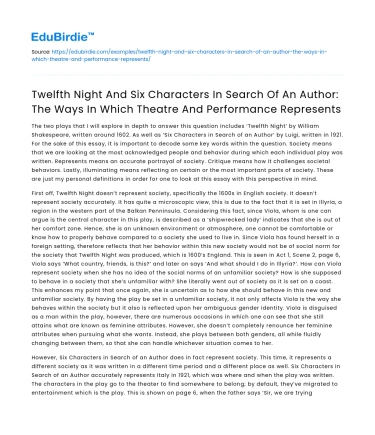The two plays that I will explore in depth to answer this question includes ‘Twelfth Night’ by William Shakespeare, written around 1602. As well as ‘Six Characters in Search of an Author’ by Luigi, written in 1921. For the sake of this essay, it is important to decode some key words within the question. Society means that we are looking at the most acknowledged people and behavior during which each individual play was written. Represents means an accurate portrayal of society. Critique means how it challenges societal behaviors. Lastly, illuminating means reflecting on certain or the most important parts of society. These are just my personal definitions in order for one to look at this essay with this perspective in mind.
First off, Twelfth Night doesn’t represent society, specifically the 1600s in English society. It doesn’t represent society accurately. It has quite a microscopic view, this is due to the fact that it is set in Illyria, a region in the western part of the Balkan Penninsula. Considering this fact, since Viola, whom is one can argue is the central character in this play, is described as a ‘shipwrecked lady’ indicates that she is out of her comfort zone. Hence, she is an unknown environment or atmosphere, one cannot be comfortable or know how to properly behave compared to a society she used to live in. Since Viola has found herself in a foreign setting, therefore reflects that her behavior within this new society would not be of social norm for the society that Twelfth Night was produced, which is 1600’s England. This is seen in Act 1, Scene 2, page 6, Viola says ‘What country, friends, is this?’ and later on says ‘And what should I do in Illyria?’. How can Viola represent society when she has no idea of the social norms of an unfamiliar society? How is she supposed to behave in a society that she’s unfamiliar with? She literally went out of society as it is set on a coast. This enhances my point that once again, she is uncertain as to how she should behave in this new and unfamiliar society. By having the play be set in a unfamiliar society, it not only affects Viola is the way she behaves within the society but it also is reflected upon her ambiguous gender identity. Viola is disguised as a man within the play, however, there are numerous occasions in which one can see that she still attains what are known as feminine attributes. However, she doesn’t completely renounce her feminine attributes when pursuing what she wants. Instead, she plays between both genders, all while fluidly changing between them, so that she can handle whichever situation comes to her.
Save your time!
We can take care of your essay
- Proper editing and formatting
- Free revision, title page, and bibliography
- Flexible prices and money-back guarantee
However, Six Characters in Search of an Author does in fact represent society. This time, it represents a different society as it was written in a different time period and a different place as well. Six Characters in Search of an Author accurately represents Italy in 1921, which was where and when the play was written. The characters in the play go to the theater to find somewhere to belong; by default, they’ve migrated to entertainment which is the play. This is shown on page 6, when the father says ‘Sir, we are trying to find an author’. If we look at this in a societal perspective, the 1920’s did the same, especially young people. The 1920’s was a time where people migrated towards the cities in order to be in reach of entertainment. This connects directly back to society during that time as the Great Migration was occurring, therefore a population increase occurred. In the beginning of the play, six characters come on stage in hopes to be in a rehearsal of a play. Since these unexpected six characters come on stage unknowingly by the director, this could have a direct link to society within the 1920’s. Specifically that there is a double the number of characters on stage, which could have a reference to the fact that major cities were overtime becoming increasingly overpopulated because of both external and internal immigration.
Twelfth Night does critique society. Shakespeare critiques society’s obsession with class. Malvolio is obsessed with it, and is set out to be a horrible person. This is shown in Act 5, Scene 5, page 89, when Olivia says ‘He hath been most notoriously abused.’. Additionally, Viola pretends to be of a lower class. Shakespeare suggests class is easily interchangeable. This diminishes the importance of class. This shown in other plays from Shakespeare, such as ‘Romeo and Juliet’, where a huge divide between the two worlds of Romeo and Juliet is due to their societal status. However, in the end, the two families end up their feud when they found out that both Romeo and Juliet have died.






 Stuck on your essay?
Stuck on your essay?

